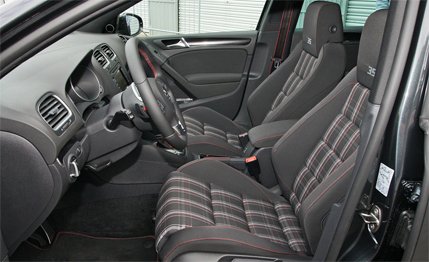 First Drive Review
First Drive Review
The Volkswagen GTI is one of our favorite cars, and not just among compacts. In terms of driving enjoyment and overall refinement, it’s a difficult car for anything on the market to top, especially when you take price into consideration. Sure, there is the far more powerful 270-hp Golf R, but that car carries a 282-pound weight penalty over the GTI, not least because of its all-wheel-drive system. Now, though, VW is trying to slot a car right between the GTI and Golf R: the GTI Edition 35, conceived to celebrate the GTI’s 35th anniversary in Europe; U.S. sales didn’t start until a few years later. (As a companion to this story, we've put together a photographic history of the GTI. You can check it out here.)
At first, the Edition 35 wasn’t going to come to the U.S., then it was, and now it’s off again. U.S.-market fate aside, VW did more than add a few badges to create this special edition—although it did add badges, too. Most important, the Edition 35 receives a more powerful engine. The U.S.-market GTI makes 200 hp, the European car delivers 210, and the GTI Edition 35 produces 235. It is fitted with the old EA113 engine, which is also used in the Golf R and can handle the extra power and torque better than the newer EA888 in its current state of evolution. Compared with the U.S. engine’s 207 lb-ft of torque—produced from 1800 to 5000 rpm—the 35 makes 221 lb-ft from 2200 to 5500 rpm.

The pumped-up EA113 is perceptibly more powerful, but only if you squeeze it hard. It needs to be revved higher, with the sweet spot somewhere around 5000 rpm, and it sounds stronger and more masculine, thanks in large part to a modified exhaust system. Even so, the Edition 35 probably needs a vigorous tailwind to get anywhere close to the claimed top speed of 154 mph (ungoverned). There is a fuel-economy penalty, of course: Consumption in the European cycle climbs 10 percent over the regular GTI’s.
Dual Clutch, Single Mind
The power is transferred to the front wheels through a slick-shifting six-speed manual or VW’s equally delightful six-speed dual-clutch transmission. In light of the fact that the smaller Polo GTI is no longer available with a manual, what does the future look like for the traditional box in other hot VWs? Not to worry, a VW engineer assures us. He says, “The GTI is a typical manual-transmission car.”
One of our favorite features of the Edition 35 is that it allows the driver to switch the stability control off completely—something not possible in the regular GTI. The only other thing we wish for is a real limited-slip differential. Unfortunately, VW fits the car only with XDS, which keeps the inside front wheel from spinning in turns by applying its brake. It helps keep the GTI neutral up to the limits of adhesion, but a true limited-slip diff would do wonders for the car’s corner exits on the track. “We want to keep the GTI Edition 35 a typical Golf with the qualities of a daily driver,” explains an engineer, adding, “A limited-slip differential is something we might consider for the Golf R.”
What about the show-off credentials of the Edition 35? Unique 18-inch “Watkins Glen” wheels are standard, and painted 19-inch “Glendale” wheels are optional. The 35 gets a unique lower front fascia, Recaro sport seats, red stitching on the carpet and seat belts, black mirrors, and darkened taillights.
These changes might seem minor, but they’re enough to set the Edition 35 apart at a glance from a seasoned eye. To the casual observer, though, it’ll be just a GTI. That’s not a bad thing at all. We like the GTI Edition 35 not predominantly for its enhancements, but because it’s still a GTI.
